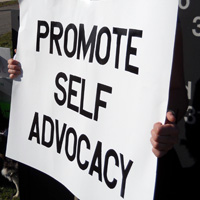

During the first Town Hall at Computers & Writing 2011, Jeremy Tirrell commented on the history of C&W and its insularity as a field. Taking his lead, I'd like us to consider how we might open up our community, how we might actualize a more robust theory of access. In order to realize such goals, I posit that we need to disable our structures and theories—disable as in take apart and disable as in actively involve disabled people. As Robert McRuer (2006) has suggested, any such disabling move
would call attention to the ways in which the disability rights movement and disability studies have resisted the demands of compulsory able-bodiedness and have demanded access to a newly imagined and newly configured public sphere where full participation is not contingent on an able body. (p. 30)
This participatory conception of access involves a redesign of the normative social systems that define, prevent, or limit access to begin with (see Banks, 2005).
And, rather than retrofitting already-existing artifacts—and rather than deciding which retrofits are reasonable and which are unreasonable—I'm asking us to wholly reconsider some of our key topics in C&W. These topics include, but are certainly not limited to, usability, human-computer interaction, accessibility, gaming, vlogging, and e-portfolios.
 I'm asking us to trade in our retrofits for a disability-inflected reconception of participatory design, a reconception that is activist in nature. The disability rights movement takes as its mantra the phrase nothing about us without us, a mantra that emphasizes the importance of self-advocacy within the context of a larger community. Self-advocacy is too often construed as unreasonable individuals asking for unreasonable and idiosyncratic handouts, when, instead, it's about self-determination and knowing how one best learns, communicates, interacts, moves, works, lives, and so on. But self-advocacy is also a misnomer in that it's not just about individual people—it's really about, as my dissertation chairs once put it, the collective advocacy of selves.
I'm asking us to trade in our retrofits for a disability-inflected reconception of participatory design, a reconception that is activist in nature. The disability rights movement takes as its mantra the phrase nothing about us without us, a mantra that emphasizes the importance of self-advocacy within the context of a larger community. Self-advocacy is too often construed as unreasonable individuals asking for unreasonable and idiosyncratic handouts, when, instead, it's about self-determination and knowing how one best learns, communicates, interacts, moves, works, lives, and so on. But self-advocacy is also a misnomer in that it's not just about individual people—it's really about, as my dissertation chairs once put it, the collective advocacy of selves.
The aim of accommodation, much like the whole of behavioral therapy, has often worked in service of making disabled people "indistinguishable from their peers" (Alyric, 2008). We live in a world that conflates disability with undesirability. It is more convenient that we cease being disabled than it is for the world to become more inclusive of disabled people. Reconfiguring interviewing practices, or dismantling ableist approaches to classroom management, or reinventing workplace events—these are not undertakings that happen in the name of access. Rather, what's happening in the name of access is this: reconfiguring disabled people, dismantling their ways of being and knowing, and reinventing them, as best we can, into normate clones.
Our unreasonable bodies advocate as they design—echoing a cripped chorus.